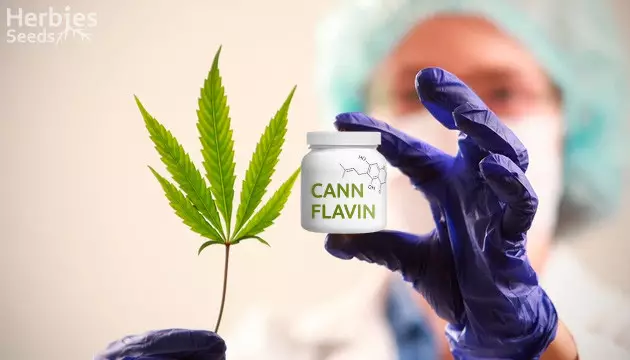Cannflavin: The Cannabis Compound That Will Replace Aspirin, And The Discovery That Will Change The Way You Treat Pain

Although there are hundreds of compounds currently found in Cannabis Sativa, only two of them, THC and CBD, are widely discussed in the medical community. There’s a reason for that – THCA and CBDA, the inactive acidic forms of THC and CBD found in raw flower, are the most common chemicals produced in cannabis, making them the most commercially promising and the easiest to study. Research into the potential medical uses of these cannabinoids continues to link their universal therapeutic value and the ability to reduce inflammation in the body. However, in reality, THC and CBD are not the only cannabis compounds with anti-inflammatory effects.
Newly-Discovered Marijuana Compounds: Safe And 30x More Potent Than Aspirin
In fact, THC and CBD are not even the most effective pain relievers found in cannabis. Credit for this may instead belong to another family of chemicals: flavonoids. You may have heard of this term if you’ve ever studied superfoods and their health benefits. Studies have shown that flavonoids contain antioxidant, anti-cancer, and neuroprotective properties. Of all the chemical elements, flavonoids have a particularly pronounced anti-inflammatory effect on animals, and researchers have been eyeing this property for several decades.
However, it is important to do more than simply determine the benefits these compounds provide to a human organism. In order to turn the research in a more pragmatic direction, we also need to figure out how to make medications from flavonoids found in cannabis, which is difficult since these chemicals are only found there in very small quantities. Luckily, ever-growing research of cannabis and its health benefits has brought cannabis flavonoids closer than ever to reaching drug store shelves.
Cannflavin A and B

Flavonoids are found in almost every plant, and in 1981, scientists discovered two types of these compounds characteristic of Cannabis Sativa – cannflavin A and B. They immediately attracted great interest from the scientific community. In a 1985 study, researchers found that cannflavin A and B have anti-inflammatory effects that are about 30 times stronger than aspirin, the most common pain reliever both then and now.
With bans on cannabis research now weakening thanks to ongoing legalization, scientists have more opportunities to research cannabis. We are just beginning to understand the unique and complex metabolic pathways that give cannabis such potential in pharmacology.
These molecules are nonpsychoactive, and they target the inflammation at the source, making them ideal painkillers.
Prof. Akhtar
Cannabis Is Closer Than Ever To Replacing Aspirin And Other Pain Relievers
In 2014, scientists published a study explaining the reason for the effectiveness of cannflavin A and B. They found that, in contrast to aspirin, cannflavin A and B blocked the production of two major chemicals that cause inflammation in animal cells – microsomal prostaglandin E2 synthase-1 and 5-lipoxygenase. Despite these important findings, almost no one paid attention to exactly how cannabis synthesized these non-psychoactive cannflavins. Nobody except a team of scientists from the University of Guelph in Canada. Thanks to their recent discovery, scientists have discovered the reaction sequence that allows Cannabis Sativa to produce flavonoids. In other words, the research team, comprised of 7 people, was finally able to figure out how cannabis produces cannflavin A and B – components that are 30 times more effective in relieving pain than aspirin. After the discovery, they filed a patent for their work. Thus, manufacturers are now one step closer to developing what is arguably the safest and most effective pain reliever in history.

Anahit International Corp, a pharmaceutical company from Toronto, bought the patent to begin the development of commercial pain relievers with cannflavin A and B. Such drugs could completely change the way we approach pain relievers. In the words of Tariq Akhtar, assistant at the Department of Molecular and Cellular Biology at the University of Guelph and co-author of the study, cannflavin A and B “are non-psychoactive and they target the inflammation at the source, making them ideal painkillers." Anahit International Corp’s chief operating officer, Darren Carrigan, adds that their intention for cannflavin A and B is “to be accessible to consumers through a variety of medical and athletic products such as creams, pills, sports drinks, transdermal patches, and other innovative options.”
Promises Of The Discovery
Given the current global opioid crisis, finding alternative pain relievers without harmful side-effects and potential health risks is a pressing and challenging task for the healthcare industry. Even the most common pain relievers like aspirin, ibuprofen, and acetaminophen (paracetamol), when used daily or taken with alcohol, can lead to kidney, stomach, and liver problems. Cannflavins, on the other hand, do not harm the internal organs and, according to the same Canadian research, are less toxic, much safer, and more effective.
Now that a new type of medicine is in the works, we can only hope that it will soon become available to everyone in need. This discovery will hopefully also lead to a positive shift toward more widespread acceptance of cannabis, plus more thorough and extensive research of its medicinal properties.
Herbies Head Shop expressly refuses to support the use, production, or supply of illegal substances. For more details read our Legal Disclaimer.










Thank you for leaving a comment for us!
Your feedback will be posted shortly after our moderator checks it.
Please note that we don’t publish reviews that: